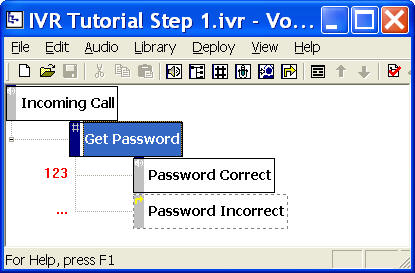1.7 Test
Lesson 1
Once deployed, you can call in to test the application. The
following is a typical session:
- Caller: call in
- IVR: answer the call
- IVR: "Welcome to my broadcast
service. Please enter your password followed by the pound key"
- Caller: 1234#
- IVR: "Your password is incorrect"
- IVR: "Welcome to my broadcast
service. Please enter your password followed by the pound key"
- Caller: 123#
- IVR: "Your password is correct"
- IVR: disconnect call
What's behind
the scene

The following explains how the IVR application controls the
interactions.
- Caller: call in
- IVR: answer the call
Incoming Call element
is active. No action to take, transition to Get Password
element.
- IVR: Welcome to my broadcast
service. Please enter your password followed by the pound key
Get Password element is
active. First play all defined prompt items; since it is a
digits element, it waits for caller input.
- Caller: 1234#
- IVR: Your password is incorrect
Since the condition of the
first transition (equals 123) is not satisfied, the second
transition is used. The condition of the second transition is
"...", which matches any input.
The second transition changes the active element to Incorrect
Password. The prompt of that element is played. Since it is
a jump element, it transition the active element to the target
element (Get Password).
- IVR: Welcome to my broadcast
service. Please enter your password followed by the pound key
Get Password element is
active. First play all defined prompt items; since it is a
digits element, it waits for caller input.
- Caller: 123#
- IVR: Your password is correct
The condition of the first
transition is satisfied, the active element now is Correct
Password. The prompt of the element is played.
- IVR: disconnect call
No more transition is
defined.
The application
The application: Lesson_1_Call_Flow.zip
 Video: IVR Call Flow Design
Video: IVR Call Flow Design
|